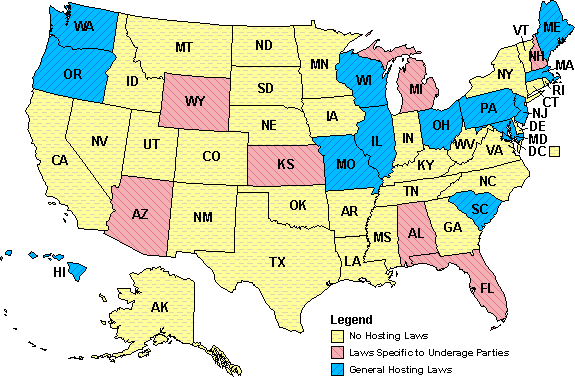 |
|||||
| Home- | | Facts On Adolescent Binge Drinking | Strategies & Approaches | What You Can Do | Resources & Links | ||||
|
Strategies and Approaches to Change Policies
| |||||
Strategies & Approaches › Change Policies › Promote Social Host Liability Laws |
|||||
Promote Social Host Liability Laws Social host liability refers to the imposition of civil penalties against adults who provide alcohol to minors if injuries are caused by those minors. Approximately 30 states have some form of social host liability law, but publicity and awareness campaigns must be in place to make them effective. At a minimum, educational efforts should increase awareness of relevant laws, penalties, and enforcement initiatives, and stress to the public that it is unacceptable for adults to furnish minors with alcohol. This type of training has proved particularly effective with Greek organizations on college campuses, some of which have radically altered their practices regarding large house parties. Hosting Underage Drinking Parties: Criminal Liability as of 1/1/2006
For additional strategies and approaches for changing policies, see the following: What You Can Do: Community References:
Bonnie, R.J. & M.E. O’Connell (eds). 2003. Reducing Underage Drinking: A Collective Responsibility. The National Academies Press, Washington, D.C. Bonnie, R.J. & M.E. O’Connell (eds). 2003. Reducing Underage Drinking: A Collective Responsibility. The National Academies Press, Washington, D.C. A Guide to Zero Tolerance and Graduated Licensing: Two Strategies that Work. Pacific Institute for Research and Evaluation. Available at: http://www.udetc.org/documents/Guide2zero.pdf#search=%22a%20guide%20to%20zero%20tolerance%20and%20graduated%20licensing%22. Accessed on [09/06/06] Office of Applied Studies. 2004. Substance Abuse and Mental Health Services Administration. NSDUH Report: Alcohol Dependence or Abuse and Age at First Use. Rockville, MD: Substance Abuse and Mental Health Services Administration. A Guide to Zero Tolerance and Graduated Licensing: Two Strategies that Work. Pacific Institute for Research and Evaluation. Available at: http://www.udetc.org/documents/Guide2zero.pdf#search=%22a%20guide%20to%20zero%20tolerance%20and%20graduated%20licensing%22. Accessed on [09/06/06] A Guide to Zero Tolerance and Graduated Licensing: Two Strategies that Work. Pacific Institute for Research and Evaluation. Available at: http://www.udetc.org/documents/Guide2zero.pdf#search=%22a%20guide%20to%20zero%20tolerance%20and%20graduated%20licensing%22. Accessed on [09/06/06] A Guide to Zero Tolerance and Graduated Licensing: Two Strategies that Work. Pacific Institute for Research and Evaluation. Available at: http://www.udetc.org/documents/Guide2zero.pdf#search=%22a%20guide%20to%20zero%20tolerance%20and%20graduated%20licensing%22. Accessed on [09/06/06] Underage Drinking Prevention Action Guide and Planner. 2001. Center for Substance Abuse Prevention. Available at: http://media.shs.net/prevline/pdfs/phd858.pdf#search=%22underage%20drinking%20prevention%20action%20guide%20and%20planner%22. Accessed on [08/25/06] A Guide to Zero Tolerance and Graduated Licensing: Two Strategies that Work. Pacific Institute for Research and Evaluation. Available at: http://www.udetc.org/documents/Guide2zero.pdf#search=%22a%20guide%20to%20zero%20tolerance%20and%20graduated%20licensing%22. Accessed on [09/06/06] Environmental Strategies to Prevent Alcohol Problems on College Campuses. 2005. Pacific Institute for Research and Evaluation. Available at: http://www.udetc.org/documents/EnviroStrat.pdf#search=%22strategies%20to%20promote%20alcohol%20free%20events%22. Accessed on [08/29/06] Johnson, K.D. Underage Drinking: Problem-Oriented Guides for Police Problem-Specific Guides Services. U.S. Dept. of Justice. Available at: http://www.popcenter.org/problems/PDFs/underage.pdf#search=%22statistics%20on%20alcohol%20free%20events%20and%20underage%20drinking%22. Accessed on [09/01/06] Drinking in America: Myths, Realities, and Prevention Policy. U.S. Dept. of Justice. Available at: http://www.udetc.org/documents/Drinking_in_America.pdf. Accessed on [09/05/06] The Relationship Between Alcohol Availability and Injury and Crime. Available at: http://www.alcoholpolicymd.com/alcohol_and_health/alc_availability.htm. Accessed on [01/09/06] Bans of Off-Premises Sunday Sales. Alcohol Policy Information System. Available at: http://www.alcoholpolicy.niaaa.nih.gov/index.asp?Type=BAS_APIS&SEC={1215CDC3-980E-4868-87FB-524C3A1EC415}. Accessed on [09/28/06] |
|||||
